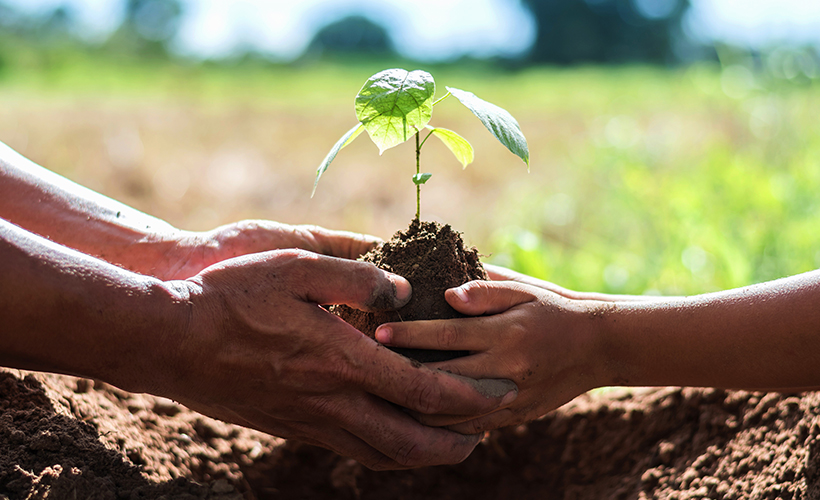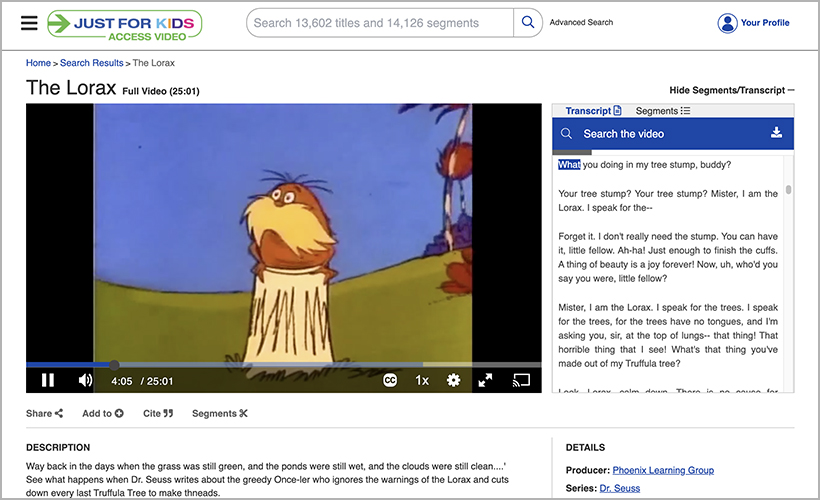Since 1970, every April 22 has been dedicated to increasing awareness about the environment and the steps we can take to preserve the only home we’ve ever known, including helping clean up pollution, preventing deforestation, preserving precious habitats for our wildlife, and fighting the carbon emissions that contribute to climate change. Infobase has a wide variety of content that your institution can use to inspire people of all ages in your schools and communities to take action on Earth Day and every other day of the year.
Streaming Media Resources for Earth Day
Looking for videos and other media on the environment to kick off Earth Day celebrations? Infobase’s streaming video collections— the award-winning Learn360 for K–12 schools and districts, Classroom Video On Demand for secondary schools, Films On Demand for colleges and universities, and Access Video On Demand and Just for Kids for public libraries—are a wonderful place to start, with a wide range of videos that are both educational and fun, some of which include lesson plans and student activities for educators in schools and homeschools alike.
Subscribers to Learn360 and Just for Kids can introduce younger students to the environmental issues with videos featuring their favorite characters from Cyberchase, Rosie’s Rules, and more. Plus, Learn360 subscribers have access to the editorially curated videos, interactives, audio recordings, and printables in the Learn360 Topic Centers that focus on how nature works and steps you can take to protect it. Subscribers to Learn360, Classroom Video On Demand, Access Video On Demand, and Films On Demand can find content for older students and researchers from renowned producers such as PBS and the BBC that take a deeper dive into environment- and ecology-related topics.
Here are just some of the videos and other content you can find. We have included searchable item numbers for each title for your convenience. (Not all titles are available on all platforms or in all countries. Some of these titles contain mature themes or content—viewer discretion is advised.)
Earth Day Storytime for Young Learners
- Activate Kid Power: Part 1 and Part 2 (Wild Kratts) (PBS, 2025, Item #296687 and #296688; grades PreK–2)
- I Love Nature (Doggyland, 2023, Item #287628; grades PreK–2)
- The Bumblebee Queen/Tree Love (Nature Cat) (PBS, 2023, Item #296677; grades PreK–2)
- Know Your Snow/The Nature-tastic Four and the Humongous Hurricane (Nature Cat) (PBS, 2023, Item #296676; grades PreK–2)
- Earth Yay! (Vooks, 2021, Item #279697; grades PreK–3)
- Rosie the Recycling Kid/Rosie and La Monarca (Rosie’s Rules) (PBS, 2024, Item #293793, grades PreK–5)
- Goodbye, Howard!/Re-Use Re-Do (Alma’s Way, Season 2) (PBS, 2024, Item #293047, grades PreK–5)
- Cool for You (87th Street Creative, 2021, Item #283794; grades PreK–5)
- Composting in the Clutch (Cyberchase) (PBS, 2020, Item #278175; grades 1–5)
- Going Solar (Cyberchase) (PBS, 2020, Item #278158; grades 1–5)
- The Lorax (Phoenix Learning Group, 1972, Item #66866; grades 3–5)
Learn How the Earth Works
- Learn360’s Fast & Slow Changes On Earth Topic Center
- Learn360’s Habitats and Biomes Topic Center
- Learn360’s Weather, Climate, and Natural Disasters Topic Center
- Ecosystems and Food Chains series (Visual Learning, 2024, Item #292677, grades 3–8)
- The Fiery Earth series (Visual Learning, 2024, Item #292669, grades 3–8)
- Deadly Wildfires and Resilient Lives—My World Global Curriculum (BBC Worldwide Learning, 2020, Item #274292, grades 6–12)
- Living Volcanoes (PBS, 2019, Item #188615, grades 6–12)
- Earth Science series (Camille S. DeBose, 2022, Item #280863, grades 9–12)
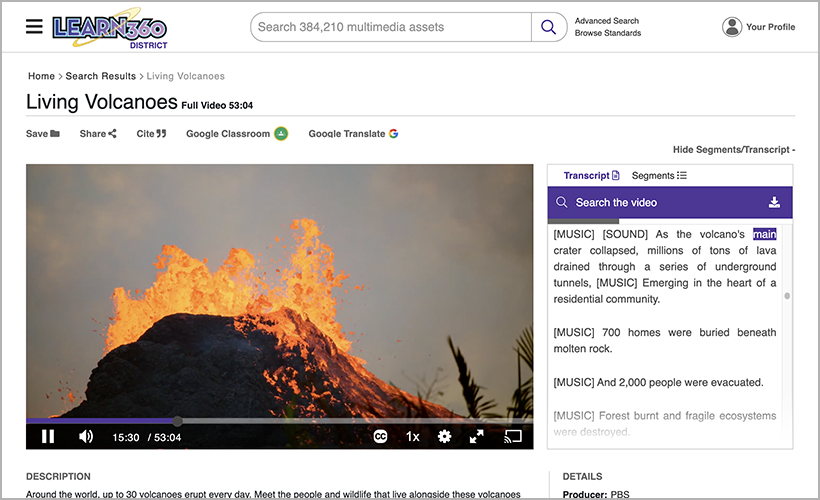
What We Can Do to Help Our Planet
- Learn360’s Protecting Our Planet Topic Center
- I Wonder: Environment series (Educational Voice Ltd., 2022, Item #286706, grades PreK–8)
- New series from Planet Bonehead (Fuelblue, 2024, grades 3–5), including Ocean Plastic Unit (Item #293949), Smart Recycling Unit (Item #294131), Water Scarcity Unit (Item #293957), Pollination Unit (Item #293259), and Echolocation Unit (Item #295021)
- Can We Cool the Planet? (PBS, 2020, Item #237681, grades 6–8)
- Youth Empowerment for the Future—My World Global Curriculum (BBC Worldwide Learning, 2020, Item #274297, grades 6–12)
- Until the Last Drop (Journeyman Pictures, 2023, Item #296504, grades 6–12)
- The Lost Salmon (Journeyman Pictures, 2023, Item #296500, grades 6–12)
- Is Carbon Capture Essential to Fighting Climate Change?: A Debate (Open to Debate, 2023, Item #291388, grades 9–12)
- Climate Activist Greta Thunberg on the Power of a Movement (NewsHour Productions, 2020, Item #195787, grades 9–Academic/AP)
- 10 Things to Know About: Plastic (Network Ireland Television, 2024, Item #296307, grades 9–Academic)
- Hope in the Water (Season 1) series (PBS, 2024, Item #293973, Academic)
- Dynamic Planet series (PBS, 2024, Item #293977, Academic)
- Changing Seas (Season 13) (American Public Television [APT]), 2021, Item #283028, Academic)
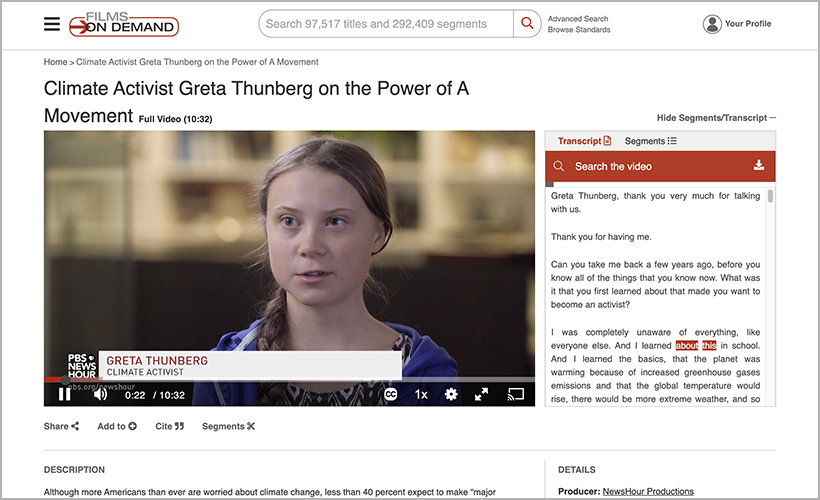
Subscribers, log into Learn360, Classroom Video On Demand, Just for Kids, Access Video On Demand, and Films On Demand today to watch these videos now!
Not a subscriber? Why not take a FREE trial?
The World Almanac® for Kids and The World Almanac® for Kids Elementary
The World Almanac for Kids for middle school students and The World Almanac for Kids Elementary for elementary students are excellent, trustworthy resources for building younger students’ online research skills, including for Earth Day. Both feature Topic Areas with illustrated articles; videos; fun games, puzzles, and other interactives; biographies of important people; and Fun Facts articles on environment-related topics. The subjects covered include:
In The World Almanac for Kids Elementary
- Earth: Describes how the Earth formed, rocks and minerals, fossils, erosion and weathering, earthquakes, volcanoes, and much more.
- Energy: Explores all aspects of energy, from the basics, such as kinetic and potential energy, to topics such as energy of motion, energy transfer, and using—and saving—energy resources.
- Habitats in Our World: Covers geography, geology, flora and fauna, and the future of seven different types of habitats found on Earth: wetlands, temperate forests, oceans, grasslands, deserts, rain forests, and polar regions.
- Weather & Climate: Covers weather, clouds and rain, and climate, plus important information on climate change, why seasons change, the difference between weather and climate, and major weather events such as thunderstorms, tornadoes, and hurricanes.
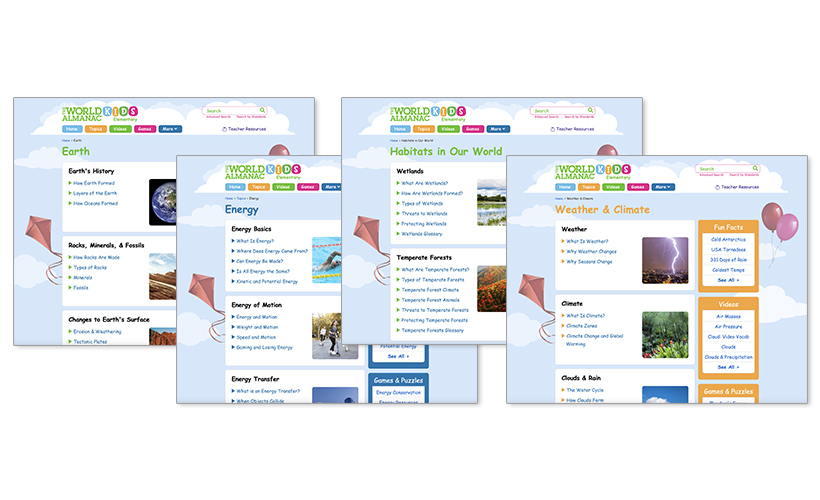
In The World Almanac for Kids
- Our Planet Earth: Explains how the Earth formed, rocks and minerals, fossils, erosion and weathering, earthquakes, volcanoes, and much more.
- Energy Today: Covers different types of energy, the science behind them, and their environmental impact. Includes information on coal, oil, and natural gas; biofuels; wind power; water power; solar power; nuclear power; geothermal energy; and hydrogen fuel, plus biographies of key people including scientists such as Steven Chu, Nikola Tesla, and James Watt.
- Weather & Climate: Covers atmosphere; weather; moisture, clouds, and rain; and climate and climate change, plus important information on how weather forms and major weather events such as thunderstorms, tornadoes, and hurricanes. Students will also find biographies of climate advocates and scientists, including Rachel Carson, Al Gore, and Greta Thunberg.
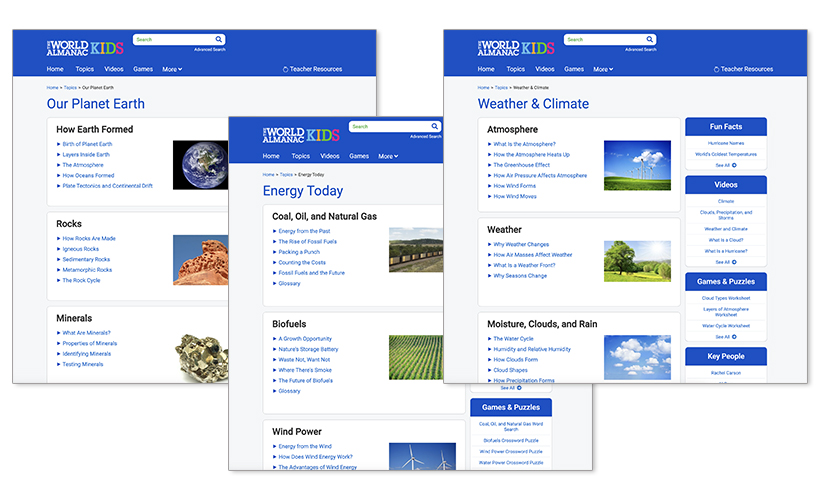
Educators will also find in both resources a wide variety of colorful and fun age-appropriate science projects and diagrams on Earth science and the environment to help them plan their lessons. Clean an oil spill, make an edible model of the Earth’s layers, create model volcanoes, investigate the effects of acid rain, and much more.
Subscribers, want to see this content for yourself? Log in today to The World Almanac for Kids or The World Almanac for Kids Elementary today!
Not a subscriber? Why not take a FREE trial?
Science Online
Looking for more science experiments for Earth Day? Check out Science Online, an excellent resource for STEM research and learning on any scientific topic. Science Online features science experiments and activities on Earth science, environmental science, marine science, weather and climate, and more. These include downloadable, printable experiments in PDF format; interactive experiments that replicate the in-class laboratory experience in a safe and user-friendly environment; and self-paced learning objects consisting of animations, video clips, slideshows, images, and diagrams, along with activities that challenge and test students’ learning of the subject matter. These activities include “A Very Hot Spot (Greenhouse Effect),” “Cleaning Up Oily Water,” “What Do People Throw Away?” and “Does Your City Have Acid Rain?”
For researchers looking for a wide variety of content on a specific ecological subject, Science Online features multiple Topic Centers devoted to subjects that are definitely of interest for budding environmentalists. Each of these Topic Centers include specially selected content that composes a virtual study guide on the topic covered, including a series of editor-selected overview articles, suggested keyword searches, key videos and animations, printable experiments, diagrams, key tables and data, and a comprehensive topic timeline.
Topic Centers you can find in Science Online include:
- Earth Science: Find content on glaciers, oceanography, soil science, and more.
- Environmental Science: Find content on climate change, ecosystems, environmental radioactivity, pollution, renewable energy, and more.
- Marine Science: Find content on biodiversity in deep oceans, the carbon cycle and oceans, ocean ecology, and more.
- Weather and Climate: Find content on climate change, natural disasters, precipitation, and more.
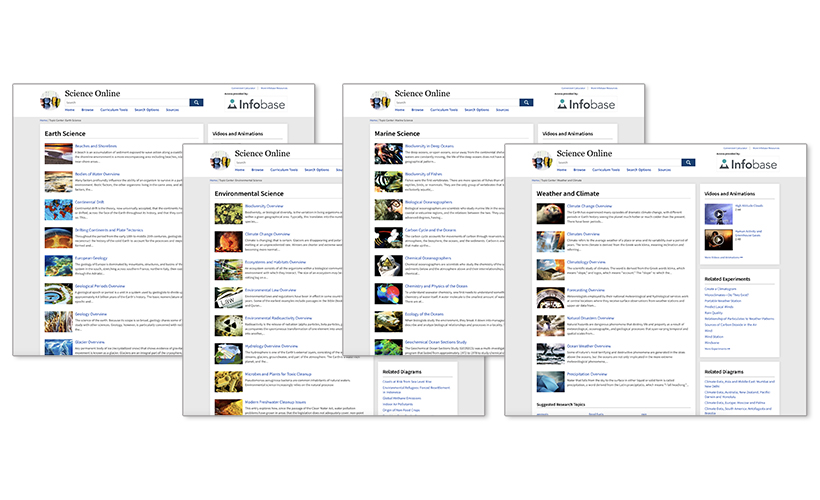
Science Online also features eLearning Modules on topics including Biomes of the Earth, Green Technology, Energy and the Environment, and Global Warming that provide an in-depth exploration of these environment-related science subjects with extensive sequential articles in a narrative format, key videos and animations, diagrams and images, and glossaries. Educators will especially appreciate the support materials—including learning objectives, discussion questions, assessment questions with answer keys, and student-based projects—that are included in these modules.
Finally, students looking for information on people in history who studied and advocated for the environment and climate issues can find them by scrolling down to the Featured People slider on Science Online’s homepage. The section on environmentalists features information and links to articles on scientists and environmental activists including Rachel Carson, Jacques-Yves Cousteau, John Muir, and many more.
Science Online subscribers, log in today to see this amazing content!
Not a subscriber? Take a FREE trial today!
Today’s Science
Are your students looking for articles related to Earth Day-related research topics on the latest developments in science? Today’s Science features thousands of original articles—written in easy-to-understand language and including stunning videos, images, and diagrams—highlighting the most important advances. The “Need a Research Topic?” section, which can be found under “Research Topics” in the upper right hand corner of the platform, is designed to jump-start student research and includes summaries of key topics with links to related articles.
The Research Topics you can find include:
- Alternative Energy
- Endangered Species
- Global Extinctions
- Global Warming and Climate Change
- Hurricanes and Other Natural Disasters
- And more!
If you have students or researchers who are thinking about taking up a career in the sciences, point them in the direction of Today’s Science’s Conversations with Scientists—more than 800 unique and original, proprietary, first-person accounts of recent breakthroughs from practicing scientists at leading institutions around the globe. These conversations can be filtered by topics including Earth Science and Environment.
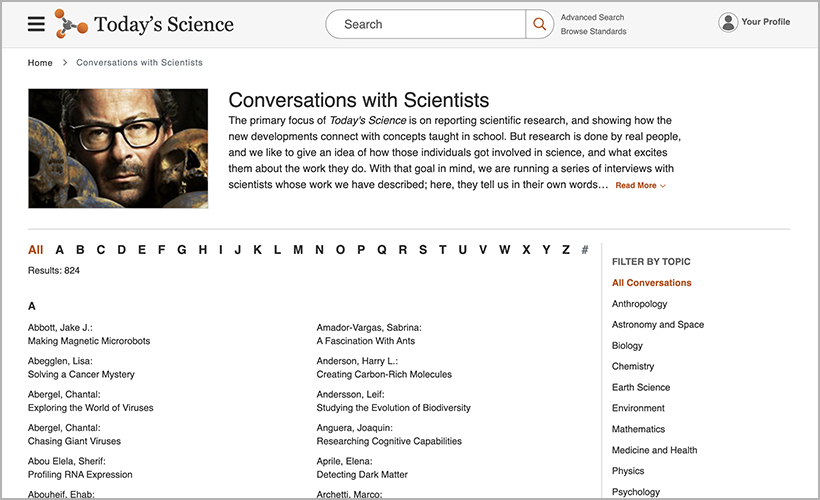
Each Conversation with Scientists article features a Q&A with a brief introduction, including a synopsis of the scientist’s career development, academic affiliations, and awards and achievements. The articles explore the how and why of the scientists’ research as well as their perspective on the latest developments in their fields and the career paths that they followed to achieve their goals.
Here are just some of the Conversations with Scientists you can find in Today’s Science that discuss environmental topics:
- Rebecca Albright: Preserving Coral Reef Ecosystems
- Chris Doughty: Tropical Forests are Heating Up
- Peter Fretwell: On Thin Ice
- Thomas M. Gernon: Big Picture Earth Science
- Peter Davis: Climate Past and Present
- Michael Letnic: Preserving Biodiversity
- Shannon B. Olsson: Speaking with the Natural World
- Chelsea M. Rochman: Combating Plastic Pollution
- Francisco Sánchez-Bayo: Protecting the Ecosystem
- Joerg M. Schaefer: The Physics of Climate Change
- Tapio Schneider: Shaping Climate Dynamics
- Steven Sherwood: Studying Atmospheric Climate Dynamics
- Patrick C. Taylor: Measuring Climate Change
- Chi Xu: Looking for “Tipping Points”
Today’s Science subscribers, check out this content—log in today!
Not a subscriber? Why not take a FREE trial?
See also:
- FREE webinar: Supplement Your Fall Instruction with Learn360 and Classroom Video On Demand’s STEAM Resources
- FREE webinar: Scientifically Speaking: Content to Pique the Curiosity of Kids Aged 8 to 80
- For Science Content, Nothing Eclipses Infobase
- Test Students’ Trivia Knowledge & Research Skills with Infobase
- Explore Space with Infobase
- Learn About Multicultural Scientists with Science Online
[Hero image source: lovelyday12/Shutterstock.com]


